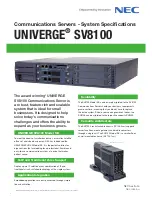
Cabling guidelines
Cabling guidelines
The cable colors in the cabling diagrams used in this chapter are for illustration purposes only.
Observe the following guidelines when working with server cables.
Before connecting cables
Before connecting cables
Note the port labels on the PCA components. Not all these components are used by all servers:
System board ports
Drive and power supply backplane ports
Expansion board ports (controllers, adapters, expanders, risers, and similar boards)
Note the label near each cable connector. This label indicates the destination port for the cable connector.
Some data cables are prebent. Do not unbend or manipulate the cables.
To prevent mechanical damage or depositing oil that is present on your hands, and other contamination, do not touch the ends of
the connectors.
When connecting cables
When connecting cables
Before connecting a cable to a port, lay the cable in place to verify the length of the cable.
Use the internal cable management features to properly route and secure the cables.
When routing cables, be sure that the cables are not in a position where they can be pinched or crimped.
Avoid tight bend radii to prevent damaging the internal wires of a power cord or a server cable. Never bend power cords and server
cables tight enough to cause a crease in the sheathing.
Make sure that the excess length of cables is properly secured to avoid excess bends, interference issues, and airflow restriction.
To prevent component damage and potential signal interference, make sure that all cables are in their appropriate routing position
before installing a new component and before closing up the server after hardware installation/maintenance.
When disconnecting cables
When disconnecting cables
Grip the body of the cable connector. Do not pull on the cable itself because this action can damage the internal wires of the cable or
the pins on the port.
If a cable does not disconnect easily, check for any release latch that must be pressed to disconnect the cable.
Cabling guidelines
174
Summary of Contents for ProLiant DL360 Gen10 Plus
Page 8: ...Component identification Component identification 8...
Page 29: ...HPE Basic Drive LED definitions 29...
Page 31: ...BIOS Platform Configuration RBSU Hot plug fans 31...
Page 36: ...Operations Operations 36...
Page 47: ...Remove the secondary PCI riser cage 47...
Page 54: ...Accessing the Systems Insight Display 54...
Page 55: ...Setup Setup 55...
Page 73: ...Hardware options installation Hardware options installation 73...
Page 108: ...Installing an 8SFF optical drive 108...
Page 122: ...Secondary PCI riser options Secondary PCI riser options 122...
Page 129: ...Full length Installing an expansion board in the secondary riser cage 129...
Page 135: ...Installing a type a Smart Array storage controller option 135...
Page 140: ...Processor and heatsink options Processor and heatsink options 140...
Page 149: ...4 LFF 11 Connect the cable Installing the Systems Insight Display power module 149...
Page 160: ...HPE Trusted Platform Module 2 0 Gen10 option HPE Trusted Platform Module 2 0 Gen10 option 160...
Page 164: ...Installing the Trusted Platform Module board Installing the Trusted Platform Module board 164...
Page 167: ...4 Proceed to Preparing the server for operation Installing the TPM board and cover 167...
Page 173: ...Cabling Cabling 173...
Page 177: ...Front power SID USB cabling Front I O cabling 177...
Page 178: ...Storage cabling Storage cabling 178...
Page 181: ...8SFF x4 2SFF backplanes to type p controller 8SFF x4 2SFF backplanes to type p controller 181...
Page 183: ...2SFF x4 backplane to primary NVMe riser 2SFF x4 backplane to primary NVMe riser 183...
Page 187: ...8SFF x4 backplane direct attach 8SFF x4 backplane direct attach 187...
Page 188: ...8SFF SAS SATA backplane to embedded SATA 8SFF SAS SATA backplane to embedded SATA 188...
Page 191: ...4LFF backplane to controllers 191...
Page 192: ...Software and configuration utilities Software and configuration utilities 192...
Page 221: ...Keeping the system current Keeping the system current 221...
Page 234: ...Troubleshooting Troubleshooting 234...
Page 238: ...Removing and replacing the system battery 238...
Page 251: ...Support and other resources Support and other resources 251...
















































